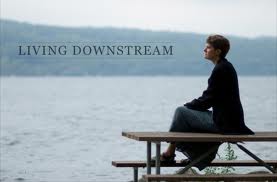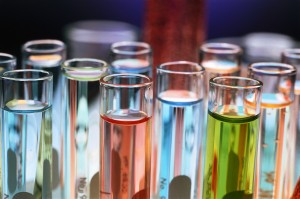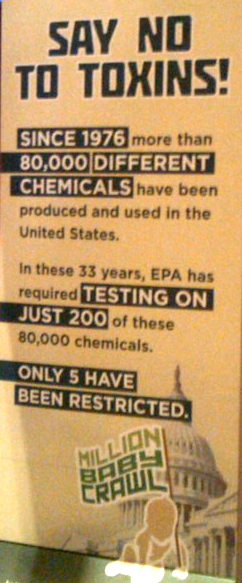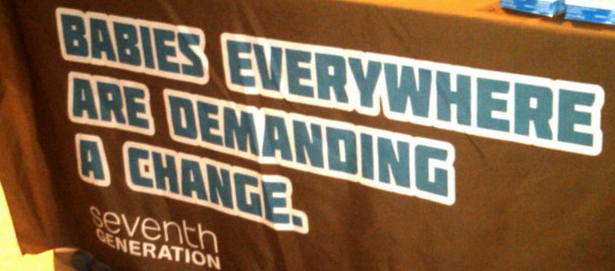PPNNE Public Affairs’ Intern’s Casey and Aziza blog about what they learned at the conference and what you might find interesting, too.
Aziza’s Perspective
I had the privilege of attending the Environmental Action Conference in Randolph, VT. I learned about the toxic chemicals in our products, how to protect ourselves, and what we can do to encourage comprehensive chemical reform. This information is from a workshop presented by Charity Carbine of VPIRG, and Dave Rapaport of Seventh Generation.
Americans are getting sicker
Public health trends have shown that cancer, developmental disorders, birth defects, and reproductive disorders are on the rise. 1 in 3 women in the USA will develop cancer in her life time; 1 in 8 women will develop breast cancer. 1 in 2 men will develop cancer as well, and the rates are going up.
The culprits: consumer products and failed policy
It turns out your cosmetics, canned food, cleaning products, and even soap may cause health problems by exposing us to toxic chemicals. Lead has been found in lipstick; Comet has been found to release chloroform and formaldehyde when used. In fact, the Environmental Working Group, which studies the levels of chemicals in people, has found 252 cancer causing chemicals and 242 chemicals that cause damage to the nervous system in some people.
How did these chemicals come to be in our everyday products, and why are they still there? It turns out that this is a problem of policy: current legislation in the United States fails to protect consumers from these chemicals. There are between 80,000 and 100,000 chemicals in commerce, with 1,000 being added each year. These chemicals are not required to undergo safety testing before sale. Current regulations only allow the EPA to test a chemical for safety is there is already proof that the chemical causes harm… a catch-22 that prevents many chemicals from being tested. Though the Toxic Substance Control Act was enacted in 1976, 62,000 chemicals were grandfathered in under the law and do not require testing for safety, and less than 200 chemicals have been tested. No chemical has been banned in 18 years, and since the law was enacted, only 5 chemicals have had their use restricted. Essentially, current legislation does not protect us from the tens of thousands of chemicals in our products.
Consumer tips
Because of failed government regulations, it is up to us to protect ourselves from these toxic substances. Fortunately, there are many ways you can actively reduce your exposure:
- Question whether you need it in the first place. Instead of buying a bottle of water at the grocery store, why not invest in a reusable, stainless steel or glass water bottle? In less than a month, the bottle will pay for itself!
- Avoiding using plastic containers to hold food and beverages. Especially avoiding heating these containers, which can cause chemicals in the plastic to leech out. Glass food storage containers are a safer option.
- Avoid polyvinyl chloride (PVC) at all costs. It is found in some plastic shower curtains and other products such as toys. PVC contains phthalates and may release dioxin, two chemicals that are known to cause cancer.
- Buy organic food. This will help reduce your exposure to pesticides and some preservatives which contain harmful chemicals.
- Avoid fragrances, which contain many unsafe chemicals.
- Beware of “green-washing” and “pink-washing.” Green washing occurs when a product is advertised as environmentally friendly, and pink-washing occurs when products are advertised as benefiting breast-cancer research. However, many of these products might cause health problems. Would you really go green by using a water bottle that contains BPA? Would you really be helping end cancer by using cosmetics that contain harmful chemicals? Be an informed consumer!
To check out the safety of some of your products, look them up in the cosmetics database at: http://www.cosmeticsdatabase.com/.
 With growing awareness of the tightly woven connections between our environment and our health, Planned Parenthood of Northern New England is making a commitment to protecting both. With a desire to share this important information with our communities we will be showing the documentary Living Downstream, an adaptation of the book by Dr. Sandra Steingraber. The movie follows Dr Steingraber and her work around the country promoting awareness of the dangers of toxic chemicals as they contaminate our world and eventually our bodies. Though the film is not set in Vermont, the issues raised are relevant in our state. Despite best intentions Vermonters, too, are exposed to dangerous chemicals via consumer products and our environment.
With growing awareness of the tightly woven connections between our environment and our health, Planned Parenthood of Northern New England is making a commitment to protecting both. With a desire to share this important information with our communities we will be showing the documentary Living Downstream, an adaptation of the book by Dr. Sandra Steingraber. The movie follows Dr Steingraber and her work around the country promoting awareness of the dangers of toxic chemicals as they contaminate our world and eventually our bodies. Though the film is not set in Vermont, the issues raised are relevant in our state. Despite best intentions Vermonters, too, are exposed to dangerous chemicals via consumer products and our environment.


 The more we learn about the 80,000-100,000 unregulated chemicals out there, the more we realize how dangerous some are to our health. There is growing evidence linking chemical exposure to
The more we learn about the 80,000-100,000 unregulated chemicals out there, the more we realize how dangerous some are to our health. There is growing evidence linking chemical exposure to 

